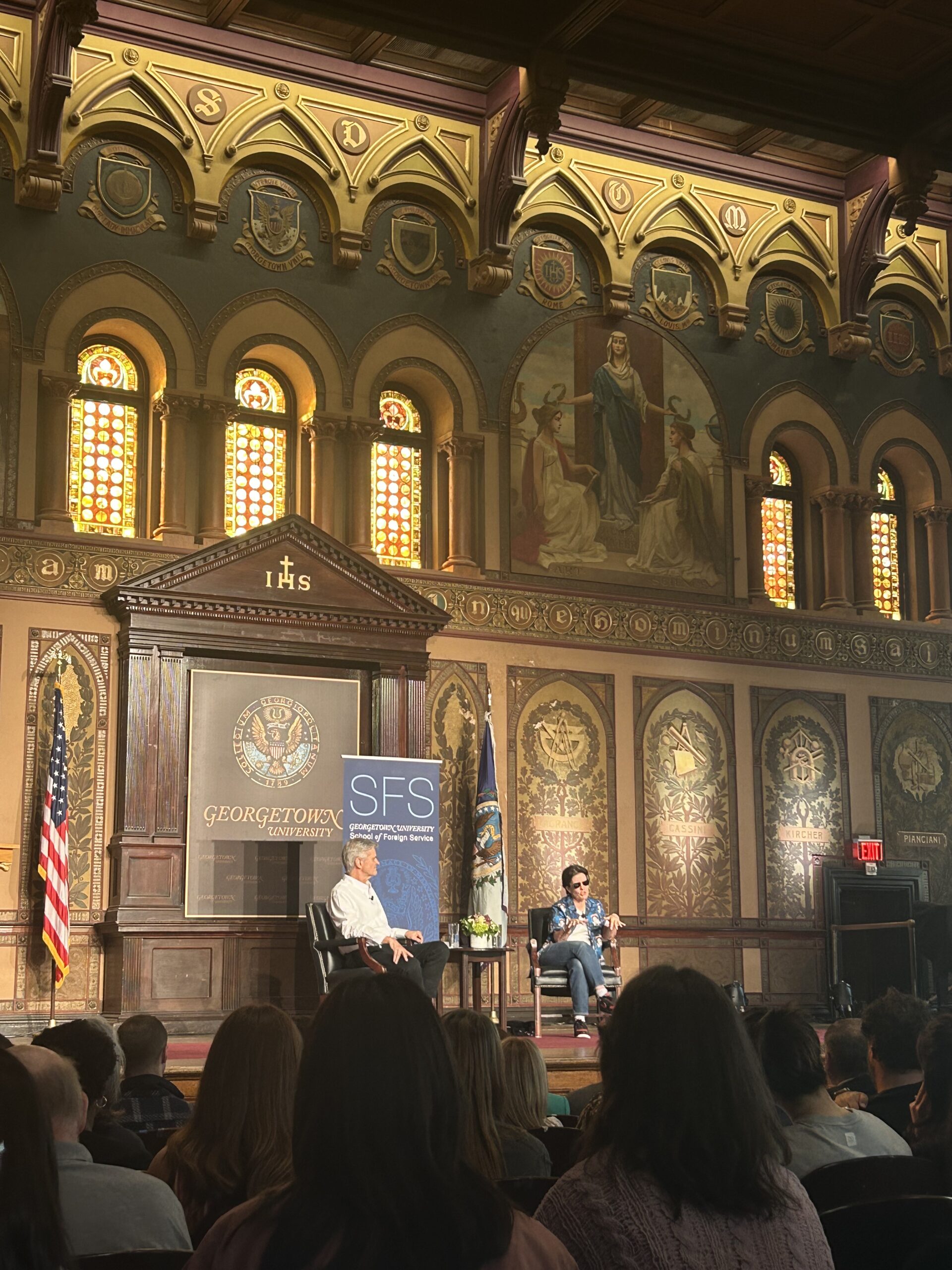Alumna and tech journalist Kara Swisher (SFS ’84) returned to Georgetown on March 14 to discuss her new book, Burn Book, in a conversation moderated by tech entrepreneur Steve Case, co-founder of AOL. Hosted by the School of Foreign Service in Gaston Hall, the event explored the tech industry’s double-edged sword: its potential for both harm and role in solving global challenges.
Swisher got her start in journalism at Georgetown, where she wrote for the Hoya until she switched to writing for the Voice. She’s since written for publications including the Washington Post, Wall Street Journal, the New York Times, and New York Magazine, and founded Recode, a technology news website that focuses on Silicon Valley.
Joel Hellman, dean of the School of Foreign Service, introduced Swisher and her investigation of the tech industry’s most powerful players. She has interviewed some of the biggest names in tech, including Steve Jobs, Bill Gates, Tim Cook, Elon Musk, and many others.
“If anything motivated tech CEOs to worry about privacy, it would be the fear that everything they thought and said would end up on one of her shows,” Hellman said.
Part memoir, part history, Burn Book is a reflection of how Swisher used her experiences as a tech journalist to critique the leading figures of Silicon Valley.
Swisher and Case are longtime friends. The pair met when Swisher, who was a Georgetown student contributing to the Washington Post at the time, was assigned to investigate AOL. At that point, no other journalist had covered the company. It was her introduction to the world of technology, later leading her to write two books on AOL’s subsequent rise and fall. Swisher credits Case with her discovery of the internet beat.
Case asked Swisher about her early career, when she first began to notice what she sees as a lack of accountability in the tech industry. She recalled one encounter at the Washington Post with Bill Gates.
Gates told journalists, “We’re gonna do whatever we want. I don’t believe in Washington, and I don’t believe in regulations,” Swisher recalled.
Swisher soon realized the rest of tech’s powerful players approached business and regulations the same way, she said.
“They were starting to do so much, first carless damage, then after a while they knew what they were doing in order to grow, grow, grow,” Swisher said.
The tech industry, Swisher said, seemed focused on rapid growth and considered safeguards as outside their realm of responsibility.
“When you invent the ship, you invent the shipwreck,” Swisher said, using a quote from Paul Vrilio, a French cultural theorist, that she included in Burn Book. In the tech industry, “I see all these ships and shipwrecks, but no lighthouses,” she said.
Swisher voiced her frustration with tech company leaders who, despite initially embracing the promise of progress, ultimately prioritize profit through advertising and data exploitation
“When you realize they are the richest people in the world, with unaccountable power, that’s a prescription for disaster,” Swisher said.
Swisher transitioned into a discussion on the lack of oversight and its potential for misuse by what she calls “the bad guys,” referring to countries that the U.S. views as adversaries. Case asked Swisher how this concern fits into the ongoing debate surrounding the potential ban of TikTok.
Swisher’s stance was clear: if she were a lawmaker, she’d vote for the ban.
“Would you let TikTok own CNN, NBC? No! Let a Chinese company own it?” Swisher asked. “Some foreign companies have surely bought newspapers and stuff like that, but a broadcast entertainment network, and the biggest one?”
The conversation pivoted to another hot topic: artificial intelligence. Case asked how the tech sector can balance Artificial Intelligence’s immense potential with its dangers.
While Swisher acknowledged the potential benefits that AI could offer across sectors such as advancements in healthcare, climate change, data organization, and beyond, she sounded a note of caution..
Contrary to sensationalized portrayals like “The Terminator,” which fuel existential fears about AI, Swisher said, the real danger of AI is when it’s used with ill-intent.
“People are malevolent, computers are not malevolent, they just aren’t. They’re whatever is put in,” she said.
Swisher advocated for protections surrounding AI development, expressing support for the Biden administration’s executive order that aims to protect innovation while fostering competition among smaller companies. Her primary concern was the potential for unchecked power concentrated in the hands of large corporations.
“The worst-case scenario is that we are at the mercy of big private companies who now control the most groundbreaking tech in history,” Swisher said.
Swisher said that in the past, the government emphasized the regulation of major industries, but a modern, polarized political environment has allowed tech companies to operate with relative impunity.
“So many companies, n0ne of which are elected, are making decisions again. And who’s going to pay the price? U.S. taxpayers, people around the globe. So I feel like this is an opportunity to finally regulate the internet,” Swisher said.
Swisher’s closing message was a call to reclaim control from unelected tech giants who wield immense power over our data and consequently our world.
“The data is ours, we paid for the internet, and now they get to do whatever they want, and I know these people and you don’t want them making decisions for you,” Swisher said. “We sort of have to take control of it back from them, and I fear we will not.”





